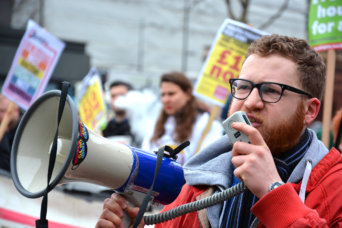- About
- Topics
- Picks
- Audio
- Story
- In-Depth
- Opinion
- News
- Donate
- Signup for our newsletterOur Editors' Best Picks.Send
Read, Debate: Engage.
| located: | Brazil, Philippines, USA, Hungary |
|---|---|
| editor: | Gurmeet Singh |
Ask anyone, and they'll tell you how this movie ends. The bad guy takes the power, the bad guy keeps the power, the good guys do nothing and the bad guy wins. The movie ends this way because we've seen it so often throughout history: dictators come, they stay, they hardly ever leave. Which is why it's come as such a boost to hear the Human Rights Watch comment that defenders of human rights are emboldened, growing in number and challenging the various autocrats around the world.
Let's take a step back. To understand why this is significant, we should evaluate a few truisms, namely that the world is always getting better, and also, in the face of badness, there's nothing we can do.
The people who in our time have secured power have no doubt promised all the usual things: peace, prosperity, freedom from worry, protection from foreigners, protection from violence. They've promised these things, but they're delivering something else. To protect and ennoble the most degraded in society, and then exploiting and harming the people in the most extreme ways takes many forms. Trump's tax cut, Duterte's police forces of death, Bolsanaro's destruction of the Amazon.
One of the reasons people feel so helpless in the face of this rise in destructive politics is down to a combination of two strangely incompatible beliefs. Firstly, the old optimistic belief that says the world will always progress, develop and advance. And secondly, that when bad regimes (ideas, politics, people) appear in the world, there's nothing we can do against them. This, I believe, creates a lack of political action on all fronts. Firstly, when politics and history seem to be advancing (say in the election of Barack Obama), then we as citizens don't need to do anything. And then, when things go bad (say, in the election of Donald Trump) we can't do anything, since the world is so bad, and bad guys are so bad.
This curious combination of apathy and fear has one result: political inaction, which is deadly since political action is exactly what is needed to bring down autocrats. It may seem as though nothing can be done to challenge the rising tide of hatred, but that's simply because so much of news discourse focuses on the hopelessness of the situation and how the world was supposed to be getting better after all.
No, ask people who've lived through political horrors and they'll tell you that the world can be changed, and indeed, the only way it ever has been is through political action. People organising to make changes over a long period of time is what topples oppressive power, not a deus ex machina; not an act of God. Simply put, the concentrated and repeated use of people power leads to political change. Otherwise, the bad guys continue to win.
Only in the last several centuries have we seen a concerted and decided weakening of the power of autocrats, and the dismantling of power structures (such as hereditary titles), and a rise in the power of the enfranchised individual. All very well, but with one fatal mistake, we, as the audience, believed that the continued empowerment of ordinary citizens was inevitable. It's not inevitable, and should always be fought for.
As Kenneth Roth, Executive Director of Human Rights Watch writes:
"In some ways these are dark times for human rights. Yet while the autocrats capture the headlines, the defenders of human rights, democracy, and the rule of law are also gaining strength. The same populists who spread hatred and intolerance are spawning a resistance.The same populists who spread hatred and intolerance are spawning a resistance. The excesses of autocratic rule are fueling a counterattack. That reaction is increasing the cost of serious human rights violations, which ultimately is the best way to force abusive governments to curb them. This mounting pressure illustrates the possibility of defending human rights—indeed, the responsibility to do so—even in darker times".
Photo: EYE DJ
